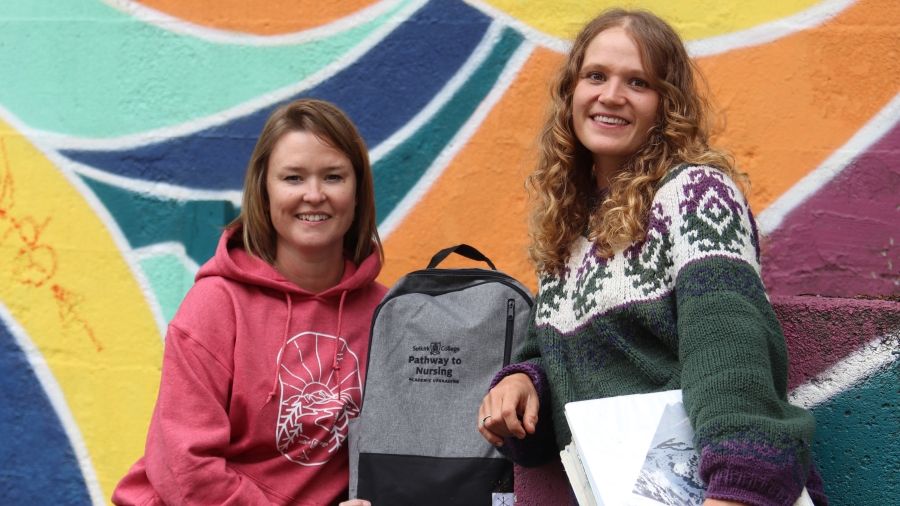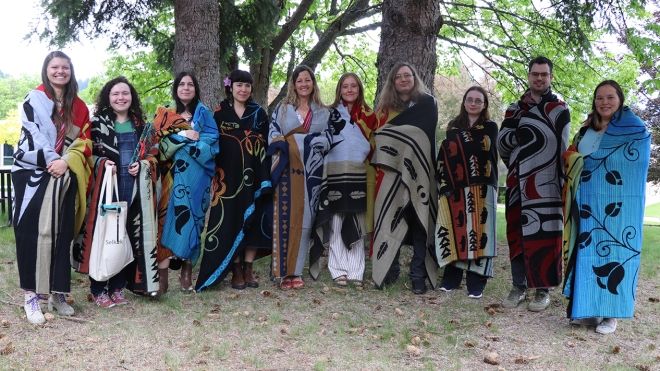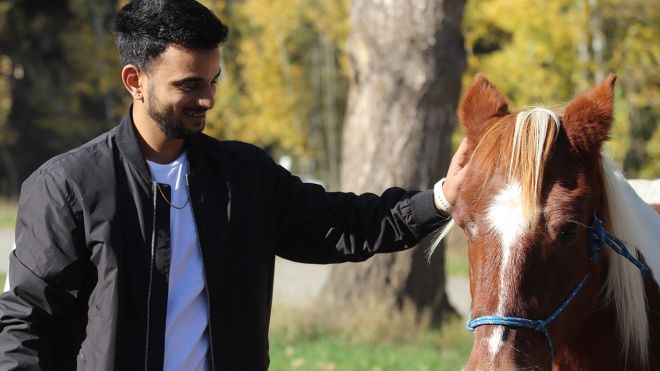Social Service Worker - Certificate
Overview
Your sense of caring may have come naturally, or perhaps your life has been touched by circumstances that kindle a sense of empathy and a desire to be of service.
Up to 90% of our Social Service Worker (SSW) graduates find stable, satisfying work. A shortage of workers is predicted over the next five years.
*This program may be eligible for the post-graduation work permit (PGWP).
Make a Career of Helping Others
Choose social service work if you:
- Want to help build healthy communities
- Have a strong desire to support others
- Believe in caring for others
- Want to help build healthy communities
- Have a strong desire to support others
- Believe in caring for others
- Feel a sense of duty to your community
- Want to work with marginalized populations
Hands-On Learning
Practicums include a variety of services and programs serving a wide range of populations that includes people who live in poverty, are young, are aging, have substance use and/or mental health problems, have behavioral problems, or other issues that interfere with their ability to cope successfully in a demanding society.
You will have the opportunity to demonstrate skills, including:
- Advocacy
- Child and youth care
- Employment supports
- Substance use awareness
- Group facilitation
- Community support and individual support
- Problem-solving and communication skills
Future Opportunities
After you complete your Social Service Worker Certificate, you can apply to two Human Services Diploma specialties at Selkirk College and also to related programs at other universities.
News
Program Outcomes
Upon successful completion of this program, students will be able to:
- Demonstrate professionalism in practice consistent with the code of ethics and standards of practice of their respective disciplines
- Use effective interpersonal skills, including active listening, collaboration, self-awareness and conflict resolution within multi-faceted roles and contexts
- Understand and respect cultural differences and multiple ways of knowing
- Practice from an ethic of inclusivity
- Establish and maintain wellness strategies to assure work/life balance both personally and professionally
- Engage in critical thinking, problem-solving and reflective practice
Admission Requirements
- Completion of English Studies 12 or equivalent with a minimum of 60% or higher
- Applicants who have previously completed a related certificate and are returning for entry into the second year of a Human Services Diploma are required to provide evidence of completion of a certificate in ECCE, EACSW, SSW or equivalent within the last five years. Acceptance for those who graduated prior to five years will be based on evidence of work in the human service field and/or professional development.
- The College Readiness Tool (CRT) must be completed prior to starting the program. If you have completed the assessment previously at Selkirk, it's not necessary to do it again. Please see CRT for more information.
- An official copy of all secondary and post-secondary transcripts
- Two completed personal reference forms
- A 30 hour work experience form completed by a supervisor who has observed the applicant in a volunteer or paid work situation is required
- Proof of a negative tuberculosis test or of a clear chest x-ray that is less than 6 months old for those who have been requested to have this from our community partners
- A current criminal record check from the Ministry of Justice. Some types of criminal records may limit or prohibit acceptance in field placement; acceptance into field placement is a requirement for program promotion
- Current résumé
- Personal Statement of interest (250 words)
- An orientation session is required and will be arranged by the program designate
Basic computer skills are required for this program. Necessary skills include knowledge of internet, email, word processing and file management. You are encouraged to complete the Computer Skills Self-Assessment.
APPLICATION PROCESS
1. CERTIFICATE, ADVANCED CERTIFICATE& DIPLOMA PROGRAMS
Students applying to the diploma program immediately following completion of a Human Services Certificate Program, may request that the contents of their file be transferred.
2. PART-TIME STUDIES IN HUMAN SERVICES PROGRAMS
a) Acceptance to an individual course does not constitute admission to the program. All program admissions will be considered according to Part I, A: Admissions Requirements.
b) The ECCE, EACSW, SSW Certificate programs and the Human Services Diploma program may be completed on a part-time basis depending on number of spaces available. Students choosing to complete a program on a part time basis must meet with a program coordinator, councillor and/or School Chair at the time of acceptance to plan a course of studies.
c) Students who have been accepted for part time studies and are in good standing academically will normally be accepted upon re-application to the next term. Refer to Part II, Section B, Promotions re: academic requirements.
In order to receive your credential in your program, you must maintain a minimum GPA of 2.00 and a minimum of 60% or better in all semester courses.
B. PROMOTION
1. In order to progress to the next semester, the following requirements must be met.
a) Completion of all courses in the semester with a minimum overall cumulative GPA of 2.00 and a grade of a “C” or better in all semester courses.
b) Promotion to the second year of the Diploma program requires a cumulative GPA of 2.33 during the first year of studies or School Chair approval
2. Promotion to practicum will be determined by the following criteria:
a) A grade of "C" or better in all required courses as defined in Part II, C, Graduation Requirements.
b) Some types of criminal records may limit or prohibit a student's acceptance in field placement agencies. Ability to be accepted into field placement is a requirement for admission and promotion.
3. A student’s performance will be reviewed by program faculty when:
a) Grades in one or more courses fall below a “C”.
b) Unacceptable behaviour, inappropriate interpersonal skills, and/or patterns of absence are displayed (as outlined in program policies).
c) On probation.
4. Considerations for practicum placement:
a) Practicum placements are normally completed within the College region.
b) To avoid a conflict of interest, students are expected to inform instructors of agencies where family and/or personal connections exist.
c) Practicum placements will be arranged by a program instructor.
d) Agency staff will be informed if a student has refused to sign a waiver authorizing the College to share personal information about the student with agency staff.
5. Students will not be placed in practicum based on the following:
a) The student has not demonstrated readiness for practicum placement.
b) Two agencies refuse to accept the student in practicum placement.
c) The student lacks means of transportation.
6. Practicum evaluation will be based on:
a) A review of the student's performance in relation to stated course competencies.
b) A joint review comprised of college instructor, agency supervisor and student.
c) Completed practicum assignments.
In order to graduate with Honors students must meet all program requirements with no grades less than a B- and a cumulative GPA of 3.5 or higher.
Courses
ENGL110 - College Composition
ENGL 110 introduces students to the world of scholarly writing -- reading it, thinking about it, and producing it as academic researchers. Students will explore how professional and/or academic writers across disciplines communicate to a variety of audiences. Students will practice active reading, writing and critical thinking skills by conducting scholarly research on a topic. This course aims to equip students with the skills and knowledge they need to write effectively within academic contexts.
FAM180 - Family Dynamics
FAM 180 Family Dynamics is designed to provide students with a variety of theoretical perspectives to understanding families. It considers the diversity of families through the lenses of the life course perspective and political policies. Family formation, parenting, separation and divorce and aging are all examined. Family issues are also considered, including marriage and death rituals, work and poverty, same sex relationships, disabilities and immigrants. Policies that affect families are explored through an examination of violence in the family and political trends. The course is intended to be a foundation for further study of families.
HSER174 - Interpersonal Communications
HSER 174 Interpersonal Communications provides the student with an opportunity to examine personal goals, values and attitudes; develop and practice listening and responding skills, and become more aware of personal strengths and limitations. This course is designed to help students gain self-understanding in order to be more effective in working with people.
PSYC100 - Introductory Psychology I
PSYC 100 Introductory Psychology I is an introduction to the methods, theory and practice of psychology as a science. Among others, topics will include motivation and emotion, learning and memory, biological foundations, sensation and perception. Other topics are added at the discretion of the individual instructor. Class demonstrations and activities are used to illustrate concepts. Teaching methods and resources in the course vary with the instructor.
SSW160 - Introduction to Social Work I
SSW 160 Introduction to Social Work I is designed to introduce students to the practice of social work, emphasizing a generalist approach and considering the ideological and historical influences which have shaped social work in Canada. The values, knowledge, and skill foundations to this challenging profession are investigated. Further, it explores the roles of social workers and their methods of intervention based on several practice frameworks, including systems, strengths perspective, structural, anti-oppressive, feminist and Aboriginal approaches. This exploration includes a review of the relevant codes of ethics and practice standards that guide practitioners. Social structures that influence people's lives are also examined along with how various sources and forms of oppression and marginalization impact the lives of people in Canadian society.
SSW162 - Community Resources
SSW 162 Community Resources is designed to assist students to prepare for practicum placement. Students will explore domains of practice and roles Social Service Workers have in the Human Services. Throughout the course, students observe and analyze resources and integrate observations with information that is presented in other Social Service Worker courses.
ADD184 - Introduction to Addictions
ADD 184 Introduction to Addictions is designed as an introductory exploration of both substance and behavioural addiction. The five perspectives of addiction are identified and explored. Current research in the biological, psychological, social and spiritual factors of addiction are considered, and treatment models are specified that correspond with the five perspectives of addiction. Emphasis is placed on social factors, including marginalization, stigmatization, poverty, and dislocation and are identified and explored through the lens of First Nations, LBGTQ, women, disabilities, men, older adults, etc. Historical factors of addiction are explored and their influence on current drug policies are identified. Advocacy and empowerment skills for working with those with addictions are identified. Professional behavior skills within the addictions field are practiced.
ENGL111 - Introduction to Literature
ENGL 111 Introduction to Literature is about living more intensely. Rather than providing answers, literature prompts us to ask better questions of ourselves and each other. Drama, poetry, short stories, and novels will guide us in discussion, reflection, and writing about literature.
PSYC101 - Introductory Psychology II
PSYC 101 Introductory Psychology II covers topics include thinking and other cognitive processes, development of the individual, personality, mental disorders, health and social psychology. Other topics are added at the discretion of the instructor. Class demonstrations and activities are used to illustrate concepts. Teaching methods and resources in the course vary with the instructor.
SSW157 - Group Skills
SSW 157 Group Skills, offers knowledge and skill development that can be applied to a large number of settings: in the workplace as a team member; working with specific client groups including children, adolescents, families, special interest groups; leading and/or participating in learning and discussion groups; planning, implementing and evaluating community development work. Effective social service workers need a good understanding of working in groups and group facilitation skills. The focus will be on increasing students' awareness of their own interaction in groups and on demonstrating their ability to use effective facilitation skills with groups.
SSW161 - Introduction to Social Policy
SSW 161 Introduction to Social Policy explores social issues and how they are influenced by cultural ideologies and values. The historical development of social security policies and programs in Canada, within the context of larger global trends is examined. The impact of social policy on populations such as those who live in poverty, people with disabilities and minority populations will be explored with a view to the past, present and potential future status of the social safety net in Canada and other countries around the world.
SSW163 - Field Work I
SSW 163 Field Work I is a competency-based field placement in an agency that provides social services. Field Work I provides an overview of the role of social service worker and explores the application of ethical standards and standards of practice. Students will have an opportunity to practice knowledge and skills learned in prior courses, work on their professional development, and apply effective communication in the context of professional relationships. Students will gain an understanding of inclusive practice and examine cultural competency.
SSW166 - Application of Theory to Practice
SSW 166 Application of Theory to Practice provides an overview of the role of social service work. It focuses on integrating social work theory with practical experience to enhance theoretical learning from other courses. The student will gain familiarity with the services of their assigned practicum agency, the mandate and policies of the agency and the other resources in the community. The course offers opportunities for collaboration that will enhance students’ ability to interact professionally.
SSW168 - Field Work II
SSW 168 Field Work II is a full-time field placement for five weeks following the winter semester that affords the student the opportunity to practice the skills learned in the previous two semesters. Field placement provides an opportunity for students to demonstrate competency required for permanent employment in Social Service Agencies. On-line weekly seminars will support this practicum.
Tuition & Fees
Find Out More
We look forward to connecting with you! Fill out this form and we'll reach out to you.



